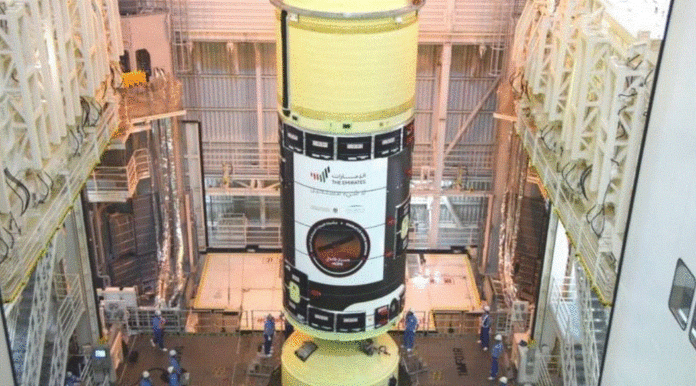Web Report
The launch of the UAE’s Mars probe has been postponed, it was announced on Tuesday. The Hope probe was scheduled to launch at 00.51 on July 15. It will now launch on Friday, July 17, at 12.43am UAE time.
“The UAE Space Agency and the Mohammed bin Rashid Space Centre, in collaboration with Mitsubishi Heavy Industries, have announced a delay of the Emirates Mars Mission’s Hope Probe launch due to the weather conditions at the launch site of Tanegashima Island in Japan,” the UAE Government tweeted.
The probe’s scheduled launch date of July 15 represented the opening of the launch window for the Emirates Mars Mission, which extends to August 13, 2020. Regardless of when it launches during this 30-day window, it is expected reach the Martian orbit in February 2021.
The probe aims to give mankind a complete picture of the Martian atmosphere. Data collected will be shared with over 200 research centres across the world.
UAE mission to build city on Mars possible: NASA scientist
The first step in that direction will be to return samples from Mars to demonstrate that humans can go there and actually come back.
The UAE’s ambitious project to build the first human settlement on Mars by 2117 is “possible”, a senior scientist at the National Aeronautics and Space Administration (NASA) has said. To achieve the goal, a methodical approach will have to be adopted as the country collaborates with other major international space institutions, she said
“I think we’ll get there,” said Dr Lori Glaze, planetary science division director at NASA, in a virtual meeting organised by the US Embassy in Abu Dhabi on Sunday.
The NASA scientist added: “I would say that having multiple countries now [on Mars exploration] has increased our capability [globally] of going back and forth to Mars.”
However, Dr Glaze clarified that “there’s a lot of work ahead before we are ready to really send humans to Mars”.
“I think it is very important that we take a methodical approach where we make sure we take each step at a time”.
The first step in that direction will be to return samples from Mars to demonstrate that humans can go there and actually come back, the scientist explained. Then, the team will have to prove that a heavier spacecraft could be sent to Mars and bring people back to Earth.
“We need to be able to land those heavy spacecraft on Mars and then we need to be able to launch it off of the surface of Mars. This has never been done before,” Dr Glaze pointed out.
“We need to be able to demonstrate in-orbit rendezvous at Mars … that once we’ve launched from the surface to then rendezvous with another spacecraft and then be able to get out of orbit and come back to Earth.”
All these things will have to be demonstrated before the first human is sent to the Red Planet, she said.
“I think we need to have realistic expectation and take it one step at a time and keep moving to that next step and that next level of capability so that we can eventually realise that dream,” the scientist said.








































